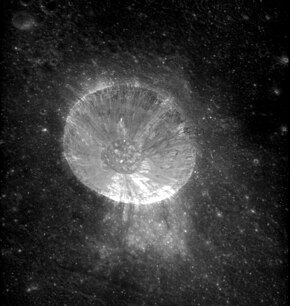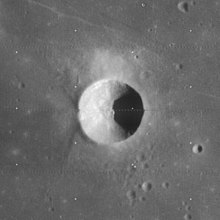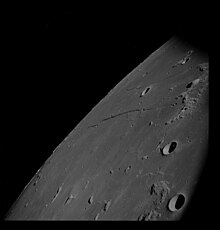Cauchy (crater)
 From Wikipedia - Reading time: 8 min
From Wikipedia - Reading time: 8 min
 Apollo 17 image, with north at bottom | |
| Coordinates | 9°34′N 38°38′E / 9.56°N 38.63°E |
|---|---|
| Diameter | 11.8 km (7.3 mi) |
| Depth | 2.6 km (1.6 mi) |
| Colongitude | 321° at sunrise |
| Eponym | Augustin L. Cauchy |


Cauchy is a small lunar impact crater on the eastern Mare Tranquillitatis. It was named after French mathematician Augustin-Louis Cauchy.[1] It is circular and symmetric, with a small interior floor at the midpoint of the sloping inner walls. Due to the high albedo of this bowl-shaped formation, it is particularly prominent at full Moon.
Cauchy lies between the Rupes Cauchy and the Rimae Cauchy, as described below.
South of Rupes Cauchy are two lunar domes designated Omega (ω) Cauchy and Tau (τ) Cauchy. They lie to the south and southwest of Cauchy respectively. Each lunar dome has a small depression at its crest, which is likely to be a volcanic vent rather than an impact crater. The vent at the top of Omega Cauchy is called Donna.
Rupes Cauchy
[edit]
To the south of Cauchy is a 120-km fault in the surface named the Rupes Cauchy, which forms a series of cliffs or escarpments. This wall roughly parallels the Rima Cauchy to the north.
Rupes Cauchy was named Fossa Casalis in a 1974 map, but this was not approved by the IAU.[2] The term Rupes was used in favor of Fossa for the names of lunar scarps.
Rima Cauchy
[edit]To the north of Cauchy is the rille named Rima Cauchy, a 210-kilometer-long graben.
Rima Cauchy was named Fossa Cauchy in a 1974 map, but term Rima was used in favor of Fossa for the names of lunar rilles.[2]
Satellite craters
[edit]By convention these features are identified on lunar maps by placing the letter on the side of the crater midpoint that is closest to Cauchy.

| Cauchy | Latitude | Longitude | Diameter |
|---|---|---|---|
| A | 12.1° N | 37.9° E | 8 km |
| B | 9.8° N | 35.8° E | 6 km |
| C | 8.2° N | 38.9° E | 4 km |
| D | 10.0° N | 40.3° E | 9 km |
| E | 8.9° N | 38.6° E | 4 km |
| F | 9.6° N | 36.8° E | 4 km |
| M | 7.6° N | 35.1° E | 5 km |
| U | 8.8° N | 42.3° E | 5 km |
| V | 9.0° N | 41.5° E | 5 km |
| W | 10.6° N | 41.6° E | 4 km |
Cauchy A is shown as Hussein on some lunar maps[2][3] based on Apollo 15 photographs, but the name was not approved by the IAU, which officially designated the crater name in 2006.[4]

References
[edit]- ^ "Cauchy (crater)". Gazetteer of Planetary Nomenclature. USGS Astrogeology Research Program.
- ^ a b c LTO-61A3 Cauchy, Lunar Topographic Orthophotomap (LTO) Series, Publisher: Defense Mapping Agency, Scale: 1:250,000.
- ^ LTO-61A2 Lucian, Lunar Topographic Orthophotomap (LTO) Series, Publisher: Defense Mapping Agency, Scale: 1:250,000.
- ^ Cauchy A, Gazetteer of Planetary Nomenclature, International Astronomical Union (IAU) Working Group for Planetary System Nomenclature (WGPSN)
- Andersson, L. E.; Whitaker, E. A. (1982). NASA Catalogue of Lunar Nomenclature. NASA RP-1097.
- Bussey, B.; Spudis, P. (2004). The Clementine Atlas of the Moon. New York: Cambridge University Press. ISBN 978-0-521-81528-4.
- Cocks, Elijah E.; Cocks, Josiah C. (1995). Who's Who on the Moon: A Biographical Dictionary of Lunar Nomenclature. Tudor Publishers. ISBN 978-0-936389-27-1.
- McDowell, Jonathan (July 15, 2007). "Lunar Nomenclature". Jonathan's Space Report. Retrieved 2007-10-24.
- Menzel, D. H.; Minnaert, M.; Levin, B.; Dollfus, A.; Bell, B. (1971). "Report on Lunar Nomenclature by the Working Group of Commission 17 of the IAU". Space Science Reviews. 12 (2): 136–186. Bibcode:1971SSRv...12..136M. doi:10.1007/BF00171763. S2CID 122125855.
- Moore, Patrick (2001). On the Moon. Sterling Publishing Co. ISBN 978-0-304-35469-6.
- Price, Fred W. (1988). The Moon Observer's Handbook. Cambridge University Press. ISBN 978-0-521-33500-3.
- Rükl, Antonín (1990). Atlas of the Moon. Kalmbach Books. ISBN 978-0-913135-17-4.
- Webb, Rev. T. W. (1962). Celestial Objects for Common Telescopes (6th revised ed.). Dover. ISBN 978-0-486-20917-3.
- Whitaker, Ewen A. (1999). Mapping and Naming the Moon. Cambridge University Press. ISBN 978-0-521-62248-6.
- Wlasuk, Peter T. (2000). Observing the Moon. Springer. ISBN 978-1-85233-193-1.
External links
[edit]- LTO-61A3 Cauchy — L&PI topographic map
 KSF
KSF